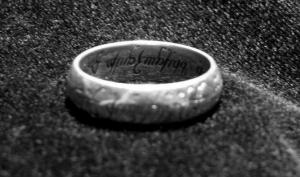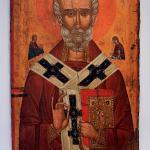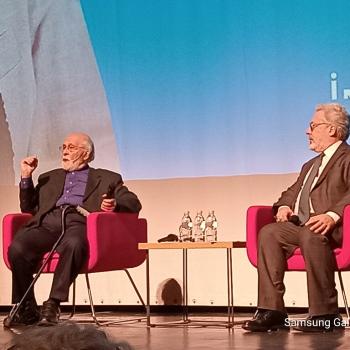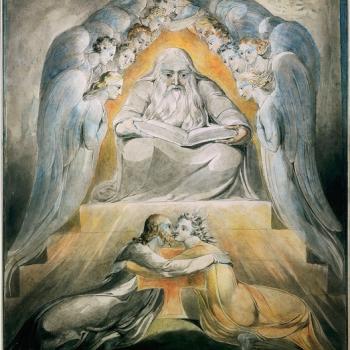
War is hell. While it might sometimes be unavoidable, it should never be glorified. It is always an evil, and as such, even when it becomes necessary, it tends to corrupt those who are involved in it. Extra care should be had by those who are forced to defend themselves against an unjust aggressor that they do not become like those they oppose.
From their own experiences, veterans know firsthand the horrors of war; many of them end up trying to do all they can to make sure they do not have to experience another war in their lifetime. They understand the true price of war, and wish no one would have to pay it. This is not to say they all end up becoming pacifists, but they end up seeing the value of pacifism and doing all that is possible to stop war before it happens. This is why it should not surprise us that J.R.R. Tolkien, a veteran of the First World War, had an ambivalent reaction to the Second. He recognized the need to resist the Axis Powers, but he was often ashamed of the way the Allies waged the war, seeing that they often used the same evil they fought against, that is, they took on the logic of Nazi Germany and used it in their war efforts
There was a solemn article in the local paper seriously advocating systematic exterminating of the entire German nation as the only proper course after military victory: because, if you please, they are rattlesnakes, and don’t know the difference between good and evil! (What of the writer?) The Germans have just as much right to declare the Poles and Jews exterminable vermin, subhuman, as we have to select the Germans: in other words, no right, whatever they have done.[1]
Tolkien would be upset at the way many of his readers have tried to use his works for warmongering. While he believed war might sometimes was unavoidable, he was clear, war is a disgrace, a total waste. He did not believe it is something to be glorified but rather, something to have us hold our heads down in shame:
The utter stupid waste of war, not only material but moral and spiritual, is so staggering to those who have to endure it. And always was (despite the poets), and always will be (despite the propagandists) – not of course that it has not is and will be necessary to face it in an evil world. But so short is human memory and so evanescent are its generations that in only about 30 years there will be few or no people with that direct experience which alone goes really to the heart. The burnt hand teaches most about fire.[2]
Tolkien saw how those who waged war tended to follow the path of Saruman or Boromir: that is, they end up embracing the same uncontrollable tools of power and domination as used by the enemy; even if they should win, they end up becoming a new force of evil in the world: “What a world. In times of my own world, it is as if Saruman had got control, stolen the Ring, and managed to down Mordor – and then become a new Lord of a scorched earth. But the unexpected always happens.”[3]
Tolkien was not a pacifist; he was a realist who wanted everyone to remember the proper goal of war was peace. It was not, of course, the peace which comes in the wake of massive destruction, but rather the peace founded upon and allowed for reconciliation between enemies. But the temptation for power gets in the way, and so war often ends with a peace founded upon violence and the sacrifice of countless innocents, as seen in the development and use of the Atomic Bomb:
The news today about ‘Atomic bombs’ is so horrifying one is stunned. The utter folly of these lunatic physicists to consent to do such work for war-purposes: calmly plotting the destruction of the world! Such explosives in men’s hands, while their moral and intellectual status is declining, is about as useful as giving out firearms to all inmates of a gaol and then saying that you hope ‘this will ensure peace’. But one good thing may arise out of it, I suppose, if the write-ups are not overheated: Japan ought to cave in. Well we’re in God’s hands. But He does not look kindly on Babel-builders.[4]
But even without the bomb, the desire for domination and control, instead of restorative justice, could be seen in the approach many took in regards Germany and the other Axis Powers. There was no charity, no desire to help the people who were under the Nazi regime. Instead, all of them were seen as the enemy; innocents were turned away, and if and when they died, there was a lot of gloating:
The appalling destruction and misery of this war mount hourly : destruction of what should be (indeed is) the common wealth of Europe, and the world, if mankind were not so besotted, wealth the loss of which will affect us all, victors or not. Yet people gloat to hear of the endless lines, 40 miles long, of miserable refugees, women and children pouring West, dying on the way. There seem no bowels of mercy or compassion, no imagination, left in this dark diabolic hour. By which I do not mean that it may not all, in the present situation, mainly (not solely) created by Germany, be necessary and inevitable. But why gloat! We were supposed to have reached a stage of civilization in which it might still be necessary to execute a criminal, but not to gloat, or to hang his wife and child by him while the orc-crowd hooted.[5]
He believed, therefore, one of the tasks of those who were soldiers was to make sure they did not lose their own humanity, as he told his son, Christopher:
Alas! that you of all folk should ever have landed yourself in the Urukhai. Like dooming a child, because of a juvenile interest in trains, to become a plate-layer for ever or a porter. But you would have it! And I expect you’d have found Orcdom anywhere. This is War. And it is the task of people like you to try and keep that in the human consciousness. At present they seem determined to perpetuate the squalor and servitude of War in Peace, so that Peace shall become like War shorn even of the last tattered rags of glory.[6]
Tolkien believed it was extremely important that those who found themselves in the middle of a time of war to struggle to preserve their humanity, to never let themselves go against their conscience when it warns them that the way they are choosing to act, the quick and easy way, the way of destruction, leads only to ruin. Those who would use Tolkien to promote unjust wars, or to follow the path of domination and control, and with it, seek total annihilation of one’s enemies instead of their conversion, only use and abuse him in the way he saw Hitler used and abused the Germanic tradition:
Anyway, I have in this War a burning private grudge – which would probably make me a better soldier at 49 than I was at 22: against that ruddy little ignoramus Adolf Hitler (for the odd thing about demonic inspiration and impetus is that it in no way enhances the purely intellectual stature: it chiefly affects the mere will). Ruining, perverting, misapplying, and making for ever accursed, that noble northern spirit, a supreme contribution to Europe, which I have ever loved, and tried to present in its true light.[7]
Tolkien would look with horror the way many have used his works to promote and justify evil, such as racism. He would see they were doing to his legacy what Hitler did with the Germanic tradition. He would resist those who would use his works to support propaganda that justifies making the enemy in war look inhuman and so worthy of utter destruction.
Tolkien warned us about the evil which is to be found in war. With Saruman and Boromir, he gave us examples of what happens when we give in to the way of power and domination. He showed us with Gollum how mercy and pity, however unearned, can serve the way for a greater good, even if those who are given it would use that mercy for evil. He shows us the hope we must have and how we must use it to maintain our integrity, while warning us of the destruction we will face if we do not. Those fans who would use him to undermine his principles, who would use him to promote militarism instead of humanism, truly have done his work, his legacy, a grave disservice. They do not understand the spirit of his works, not only the humanism, but also the Christian spirit of pity, which lies at the heart of his work. They offer no pity, no mercy, as they seek to slowly take over the world with their ideology. They can be said to have accepted the temptation of the greater Ring, not Sauron’s Ring, but Morgoth’s Ring, as they they try to control and dominate the world for their own sullied interests.
[1] J.R.R. Tolkien, The Letters of J.R.R. Tolkien. Revised and Expanded Edition. Ed. Humphrey Carpenter and Christopher Tolkien (Broadway, NY: William Morrow, 2023), 134 [Letter 81 to Christopher Tolkien].
[2] J.R.R. Tolkien, The Letters of J.R.R. Tolkien. Revised and Expanded Edition, 110 [Letter 64 to Christopher Tolkien].
[3] J.R.R. Tolkien, The Letters of J.R.R. Tolkien. Revised and Expanded Edition, 149 [Letter 91c to Christopher Tolkien].
[4] J.R.R. Tolkien, The Letters of J.R.R. Tolkien. Revised and Expanded Edition, 168 [Letter 102 to Christopher Tolkien].
[5] J.R.R. Tolkien, The Letters of J.R.R. Tolkien. Revised and Expanded Edition, 160-1 [Letter 96 to Christopher Tolkien].
[6] J.R.R. Tolkien, The Letters of J.R.R. Tolkien. Revised and Expanded Edition, 114 [Letter 66 to Christopher Tolkien].
[7] J.R.R. Tolkien, The Letters of J.R.R. Tolkien. Revised and Expanded Edition, 77 [Letter 45. to Michael Tolkien].
Stay in touch! Like A Little Bit of Nothing on Facebook.
If you liked what you read, please consider sharing it with your friends and family!
N.B.: While I read comments to moderate them, I rarely respond to them. If I don’t respond to your comment directly, don’t assume I am unthankful for it. I appreciate it. But I want readers to feel free to ask questions, and hopefully, dialogue with each other. I have shared what I wanted to say, though some responses will get a brief reply by me, or, if I find it interesting and something I can engage fully, as the foundation for another post. I have had many posts inspired or improved upon thanks to my readers.













